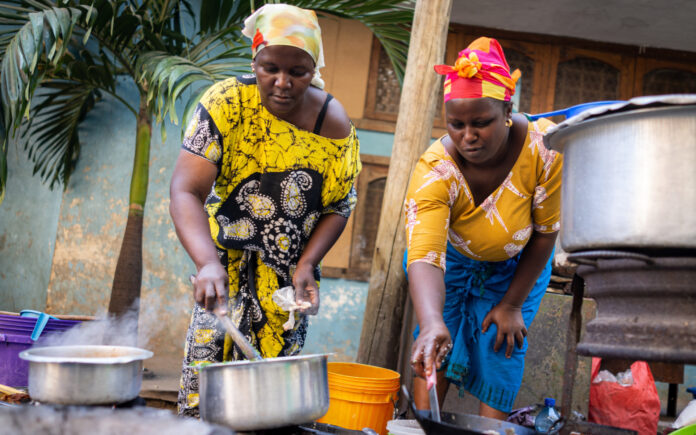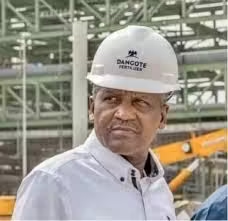By Dennis Gabriel Pepple, University of Leicester and Daminabo Pokubo, Nottingham Trent University
Low and middle-income countries generally lack access to renewable energy and rely excessively on traditional fuels like firewood and charcoal. In these countries, 2.6 billion people depend mainly on polluting fossil fuels (for electricity) and traditional biomass fuels (such as wood or charcoal for cooking) to meet their daily energy needs. In sub-Saharan Africa, about 67% of households depend primarily on traditional biomass fuels.
This heavy dependence exposes people (especially young children) in the region to particulate matter 2.5 (tiny specks of dust, dirt, soot or smoke that people breathe in). About 70% of the population is exposed to this air pollution and particulate matter contributes to about 5% of deaths among women and children under five in sub-Saharan African countries. Air pollution also increases the risk of stillbirths and preterm births, respiratory infections, and higher mortality rates in both children and adults.
In Nigeria, 60% of all households rely on electricity from privately acquired petrol and diesel generators. The national grid does not supply power to all homes. The Nigerian government’s Renewable Energy Master Plan aims to shift the country’s gas-powered electricity grid towards renewable energy, but the transition has been very slow.
We carry out research in innovation and enterprise. Because Nigeria’s people supply so much of their energy themselves, we wanted to find out whether the energy choices made by individual families could influence Nigeria’s overall transition to clean energy.
We spent four years surveying 746 rural and urban households across the four major regions in Nigeria. We asked questions about people’s income and how they consumed energy. This was important to allow us to understand how income might inform the choice to move to renewable energy like solar power and bio energy (when organic waste like animal dung or human sewage is decomposed in tanks by bacteria, producing a renewable gas).
Our research found that households combined different traditional energy sources to meet their daily needs. Regardless of their socio-economic status, families continued to use wood and charcoal along with renewable energy like solar and bio energy even when they could afford to rely on renewable energy. This is known as energy stacking, or fuel switching. About 21% of the population use renewable options together with other energy options.
We concluded from this that the energy decisions made by individual households strongly influence the renewable energy transition in Nigeria.
How people choose energy in Nigeria
Our results showed that people consider using renewable energy because generator fuel is expensive, and electricity from the national grid is unavailable:
We spend so much on petrol for generators because the electricity from NEPA (National Electric Power Authority) is so unreliable. It is becoming difficult running the generator for my business and at home. (Urban household)
The people we surveyed used multiple energy sources because diesel, petrol and gas are not always available:
We mainly use gas for our cooking, but sometimes use kerosene stoves due to the unavailability of gas in the market. In fact, every household, as far as I know, has a kerosene stove for backup in my neighbourhood (Urban household).
Wood is also used for cultural reasons when cooking traditional foods:
Let me be honest, food cooked with firewood has this unique taste especially for our local delicacy. Even though we use kerosene stoves, when it is possible, I still prefer firewood, especially when we travel to the village.
A globally used energy ladder model says that generally, people with a high income use electricity and gas to cook with. People with a low income tend to use wood, crop waste or dung. But the results of our study show that an upward transition to cleaner fuel as household income increases does not happen in the same way in Nigeria.
Even urban households of a higher socio-economic status still use traditional fuels like wood and charcoal as well as clean, modern fuels. Sometimes they have to (when there are supply problems) and sometimes they want to (for personal or cultural reasons).
Households in Nigeria choose renewable energy as part of a fluid process in which they also move back and forth to other energy supplies.
When the government plans the energy transition in Nigeria, it needs to understand household behaviours in a socio-technical context. It will need to ensure that clean energy sources are available and affordable, and also understand the value that households place on the use of energy for domestic purposes (especially cooking).
How to move to renewable energy in Nigeria
Our study suggests that the government should support investment in the manufacture of eco-friendly cooking stoves and solar or hybrid generators. (A solar generator is made up of several small portable solar panels connected to a battery. These can be placed in a sunny area to charge.) These should be subsidised and sold to households at an affordable price. This will reduce the carbon emissions generated by households, and improve health outcomes.
Second, the government should create energy policies that widen access to electricity for urban and rural households. This could include energy efficiency standards for appliances. It could also include fiscal and financial incentives to support the adoption of renewable energy.
Third, the government should introduce market-oriented reforms. These reforms must bring about energy price caps and introduce subsidies to encourage renewable energy transitions.
Lastly, government policies need to acknowledge cultural views about the taste of food cooked with clean energy sources. This will further help to encourage the renewable energy transition.![]()
Dennis Gabriel Pepple, Associate Professor and Director for Employability and Enterprise at the School of Business, University of Leicester and Daminabo Pokubo, Senior Lecturer in Entrepreneurship, Nottingham Trent University
This article is republished from The Conversation under a Creative Commons license. Read the original article.




